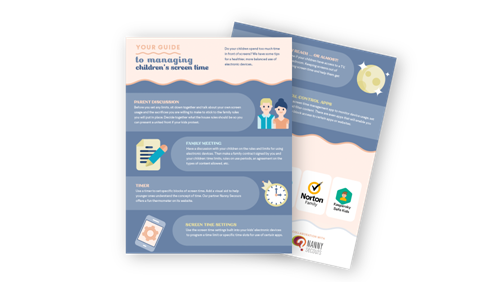
Tips for managing screen time at home
Technological development marches on, and screens are now a constant presence in our lives. Do you feel unprepared to deal with your children’s screen time demands or behaviour? Do you wonder about the impact that screen use might have on their development? Check out this article for some tips to help you balance screen use at home.
A 2019 study2 showed that people in the 13-to-18 age group spend an average of 7 hours and 38 minutes a day on entertainment media. For 8- to 12-year-olds, the average is 4 hours and 45 minutes a day, and for 3- to 4-year-olds, 2 hours a day.
Step 1: Recognize your own digital habits
According to a 2023 report by the Institut de la statistique du Québec, 25% of parents surveyed find it difficult not to look at their cell phone when spending time with their children. What’s more, 43% feel they use their cell phone too much when they’re with their children.1
Keep in mind that parents are their children’s role models. Ask yourself about your personal habits: the more you exercise moderation in your own screen use, the better able you’ll be to serve as a role model that will make it easier to manage your children’s screen time later on.
What are the recommendations for balanced screen use by children?
Studies uniformly stress the importance of not exposing children under 2 to screens. The UN suggests less than 1 hour of screen time per day for children under 5. For 6- to 12-year-olds, the Canadian Society for Exercise Physiology recommends less than 2 hours of screen time per day. For 13- to 19-year-olds, studies have no specific screen time recommendations, but they do suggest assisting them in assessing their needs based on the type of content, the circumstances, and their ability to manage their screen use properly.
Since exposure to screens before bedtime can interfere with sleep, it’s advisable for everyone to turn off their screens at least an hour before going to bed.
What risks and effects do screens have for children?
- Reduced cognitive abilities: Intensive screen use can affect things like short-term memory, attention, language development and learning to read.
- Less time spent on physical activity and free play, leading to a sedentary lifestyle and increased risk of obesity.
- Poor social skills: Lower ability to control emotions and behaviour, interference with social and family activities, etc.
- Increased risk of developing anxiety and/or depression with excessive screen use, especially smartphone use by teenagers.
In addition, sleep deprivation due to excessive exposure to screens can accentuate all the above effects.
Already a client? Go to the Accompanying Services section of your Client Space to take advantage of all the Nanny Secours offers and much more!2
How to set screen time limits at home
First, it’s important to establish clear rules on technology use:
- Hold family meetings to discuss excessive screen use: encourage open communication and dialogue;
- Teach your child about digital technology;
- Talk about the dangers of exposure to violence;
- Test the mobile apps your child likes, and choose the ones with no ads;
- Work with your child to choose high-quality, age-appropriate content;
- Allow screen use in common areas rather than in your child’s bedroom.
Second, it’s a good idea to have some screen-free time. Here are some things you can do:
- Play with your child for 10 minutes (or more);
- Talk with no distractions for 10 minutes (or more);
- Avoid giving your child your cell phone to keep him or her occupied;
- Disable notifications on electronic devices.
- Have screen-free days.
It’s also helpful to create a less “busy” environment:
- Turn off the TV when no one’s watching it;
- Unplug and put away all devices whenever possible (store them out of sight);
- Avoid installing screens in bedrooms;
- Prohibit screen use during meals.
Third, it’s advisable to employ some screen time management strategies:
- Work with your child or teenager to pick times when he or she can use each screen or video game: it’s better to set a specific time limit than to allow devices to be used all the time;
- Give your child a few minutes’ notice before the end of screen time to avoid surprises;
- Install a parental control app on devices, clearly explaining the purpose to your children to avoid tension;
- Use an app that analyzes device usage so you can set targets for gradually reducing use time each day, for both your children and yourself.
Screen use is a central activity in our children’s lives. As a parent, you can teach your children to enjoy the benefits of technology, treating it as a resource and a privilege rather than a harmful tool.
Perrine Mangeot, Psychomotrician and Family Coach
Member of the Nanny Secours Network
1. Source: Être parent au Québec en 2022, https://statistique.quebec.ca/fr/document/etre-parent-au-quebec-2022 (French only).
2. Source: Screens and population health in Montréal, https://santemontreal.qc.ca/en/public/fh/news/news/screens-and-population-health-in-montreal/.
3. Some conditions and limitations apply. Promotions, benefits and other advantages of our family accompanying services are subject to change without notice and may not be available in certain areas.




